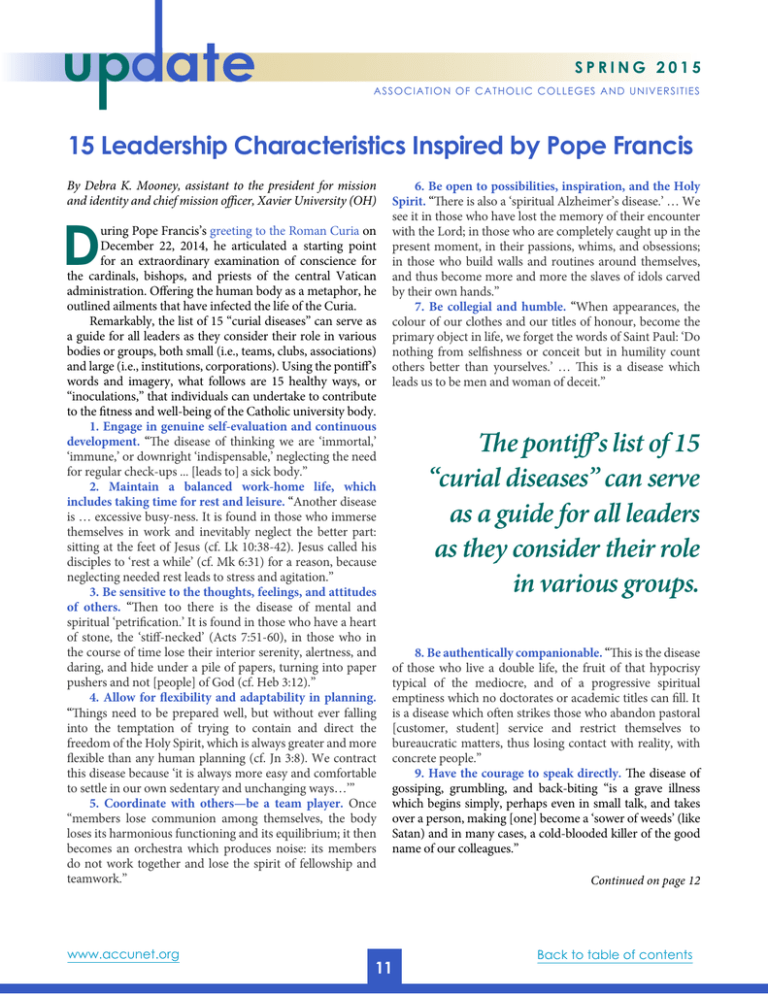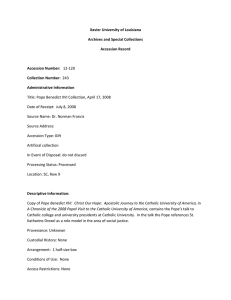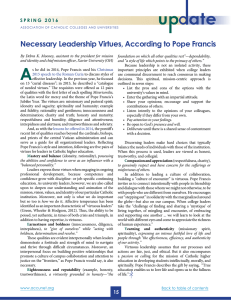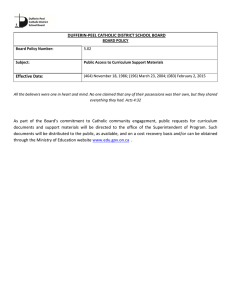15 Leadership Characteristics inspired by Pope Francis
advertisement

S P RI N G 2 0 1 5 Association of Catholic Colleges and Univer sities 15 Leadership Characteristics Inspired by Pope Francis By Debra K. Mooney, assistant to the president for mission and identity and chief mission officer, Xavier University (OH) D uring Pope Francis’s greeting to the Roman Curia on December 22, 2014, he articulated a starting point for an extraordinary examination of conscience for the cardinals, bishops, and priests of the central Vatican administration. Offering the human body as a metaphor, he outlined ailments that have infected the life of the Curia. Remarkably, the list of 15 “curial diseases” can serve as a guide for all leaders as they consider their role in various bodies or groups, both small (i.e., teams, clubs, associations) and large (i.e., institutions, corporations). Using the pontiff’s words and imagery, what follows are 15 healthy ways, or “inoculations,” that individuals can undertake to contribute to the fitness and well-being of the Catholic university body. 1. Engage in genuine self-evaluation and continuous development. “The disease of thinking we are ‘immortal,’ ‘immune,’ or downright ‘indispensable,’ neglecting the need for regular check-ups ... [leads to] a sick body.” 2. Maintain a balanced work-home life, which includes taking time for rest and leisure. “Another disease is … excessive busy-ness. It is found in those who immerse themselves in work and inevitably neglect the better part: sitting at the feet of Jesus (cf. Lk 10:38-42). Jesus called his disciples to ‘rest a while’ (cf. Mk 6:31) for a reason, because neglecting needed rest leads to stress and agitation.” 3. Be sensitive to the thoughts, feelings, and attitudes of others. “Then too there is the disease of mental and spiritual ‘petrification.’ It is found in those who have a heart of stone, the ‘stiff-necked’ (Acts 7:51-60), in those who in the course of time lose their interior serenity, alertness, and daring, and hide under a pile of papers, turning into paper pushers and not [people] of God (cf. Heb 3:12).” 4. Allow for flexibility and adaptability in planning. “Things need to be prepared well, but without ever falling into the temptation of trying to contain and direct the freedom of the Holy Spirit, which is always greater and more flexible than any human planning (cf. Jn 3:8). We contract this disease because ‘it is always more easy and comfortable to settle in our own sedentary and unchanging ways…’” 5. Coordinate with others—be a team player. Once “members lose communion among themselves, the body loses its harmonious functioning and its equilibrium; it then becomes an orchestra which produces noise: its members do not work together and lose the spirit of fellowship and teamwork.” www.accunet.org 6. Be open to possibilities, inspiration, and the Holy Spirit. “There is also a ‘spiritual Alzheimer’s disease.’ … We see it in those who have lost the memory of their encounter with the Lord; in those who are completely caught up in the present moment, in their passions, whims, and obsessions; in those who build walls and routines around themselves, and thus become more and more the slaves of idols carved by their own hands.” 7. Be collegial and humble. “When appearances, the colour of our clothes and our titles of honour, become the primary object in life, we forget the words of Saint Paul: ‘Do nothing from selfishness or conceit but in humility count others better than yourselves.’ … This is a disease which leads us to be men and woman of deceit.” The pontiff’s list of 15 “curial diseases” can serve as a guide for all leaders as they consider their role in various groups. 8. Be authentically companionable. “This is the disease of those who live a double life, the fruit of that hypocrisy typical of the mediocre, and of a progressive spiritual emptiness which no doctorates or academic titles can fill. It is a disease which often strikes those who abandon pastoral [customer, student] service and restrict themselves to bureaucratic matters, thus losing contact with reality, with concrete people.” 9. Have the courage to speak directly. The disease of gossiping, grumbling, and back-biting “is a grave illness which begins simply, perhaps even in small talk, and takes over a person, making [one] become a ‘sower of weeds’ (like Satan) and in many cases, a cold-blooded killer of the good name of our colleagues.” 11 Continued on page 12 Back to table of contents S P RI N G 2 0 1 5 Association of Catholic Colleges and Univer sities Good Advice: Pope Francis on Leadership Continued from page 11 10. Be genuine with your supervisor; avoid being a brown-noser. “This is the disease of those who court their superiors in the hope of gaining their favour. They are victims of careerism and opportunism; they honour persons and not God (cf. Mt 23:8-12). They serve, thinking only of what they can get and not of what they should give.” 11. Support the success of colleagues. “This is where each individual … loses sincerity and warmth of human relationships. When the most knowledgeable person does not put that knowledge at the service of … less knowledgeable colleagues. When we learn something and then keep it to ourselves rather than sharing it in a helpful way with others. When out of jealousy or deceit we take joy in seeing others fall instead of helping them up and encouraging them.” 12. Be optimistic and joyful. Pope Francis criticized “those glum and dour persons who think that to be serious we have to put on a face of melancholy and severity, and treat others—especially those we consider our inferiors— with rigour, brusqueness, and arrogance. In fact, a show of severity and sterile pessimism are frequently symptoms of fear and insecurity.” 13. Be generous with resources. “When an [individual] tries to fill an existential void in [the] heart by accumulating material goods, not out of need but only in order to feel secure,” he or she is guilty of selfishness. 14. Be inclusive; avoid developing informal subgroups. This is “the disease of closed circles, where belonging to a clique becomes more powerful than belonging to the Body and, in some circumstances, to Christ himself. This disease … always begins with good intentions, but with the passing of time it enslaves its members and becomes a cancer which threatens the harmony of the Body and causes immense evil.” 15. Share the limelight; avoid being showy. “This is the disease of persons who insatiably try to accumulate power and to this end are ready to slander, defame, and discredit others… so as to put themselves on display and to show that they are more capable than others. This disease does great harm to the Body because it leads persons to justify the use of any means whatsoever to attain their goal, often in the name of justice and transparency!” Join the International Federation of Catholic Universities (IFCU) and Australian Catholic University for the IFCU 25th General Assembly “Times Change. Values Endure.” Melbourne 2015 Find more information under Events at www.accunet.org. www.accunet.org 12 Back to table of contents






